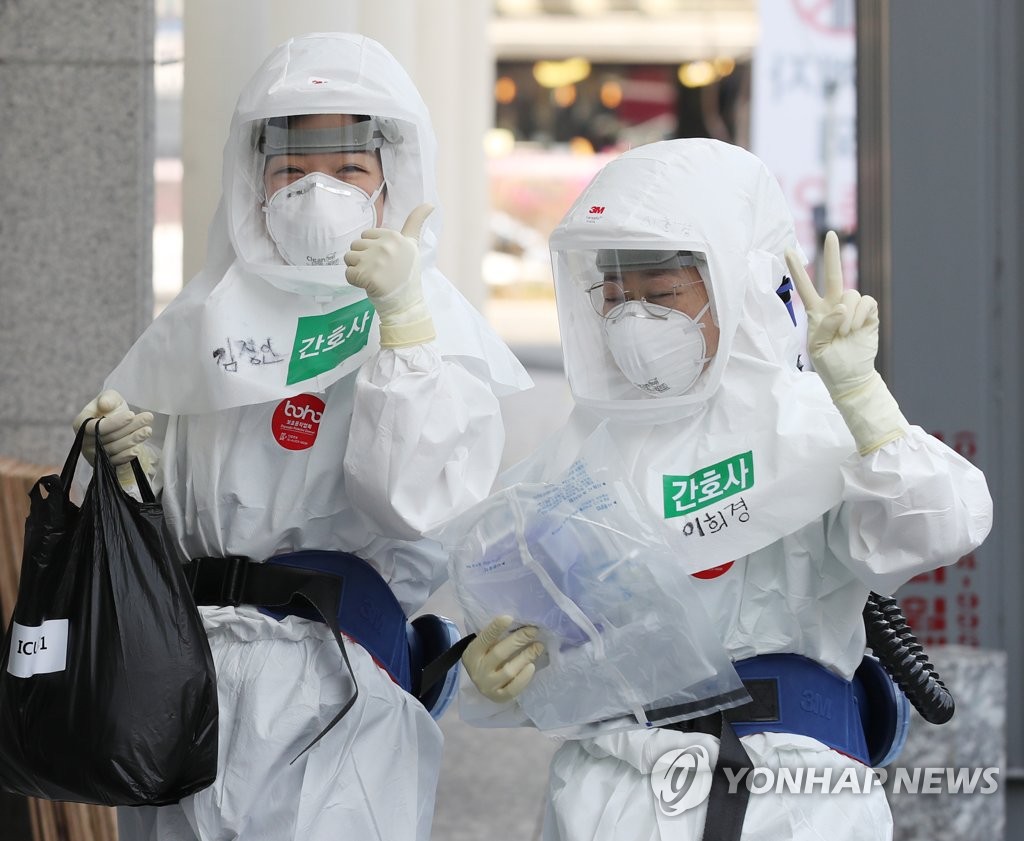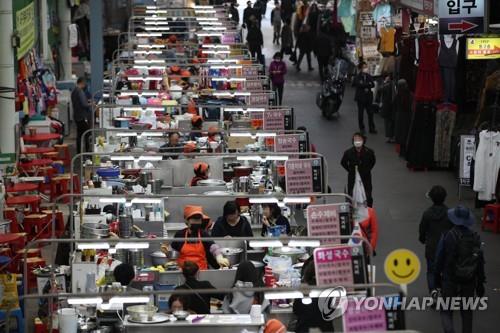- California Assembly OKs highest minimum wage in nation
- S. Korea unveils first graphic cigarette warnings
- US joins with South Korea, Japan in bid to deter North Korea
- LPGA golfer Chun In-gee finally back in action
- S. Korea won’t be top seed in final World Cup qualification round
- US men’s soccer misses 2nd straight Olympics
- US back on track in qualifying with 4-0 win over Guatemala
- High-intensity workout injuries spawn cottage industry
- CDC expands range of Zika mosquitoes into parts of Northeast
- Who knew? ‘The Walking Dead’ is helping families connect
New virus infections hover around 100 for 2nd day on imported cases
South Korea’s new coronavirus cases hovered around 100 for the second straight day Thursday, as health authorities ramped up containment measures in the densely populated Seoul metropolitan area amid a jump in imported cases.
The 104 new cases, detected Wednesday, brought the nation’s total infections to 9,241, according to the Korea Centers for Disease Control and Prevention (KCDC). The figure marked the 15th consecutive day the number of cases was in the region of 100 or lower. The death toll rose by six to 132, and 56 virus patients are in critical condition.
Seven more fatalities have been reported, but they have not been included in an official tally and will be updated on Friday. Most recent deaths involved people in their 80s and 90s, with one person in his early 60s dying from the infection.
The total number of imported cases jumped by 30 to 131, the KCDC said. In addition to the new imported cases that were detected at airports, 27 more imported infections were confirmed by local governments on Wednesday. Of the 30 cases, 25 were South Koreans and five were foreigners.


Medical workers with protective gear gesture as they arrive for a shift at Dongsan Hospital in the virus-hit city of Daegu on March 25, 2020. (Yonhap)
Daegu and North Gyeongsang Province, the nation’s two worst-affected regions, reported 26 and 12 new cases, respectively.
Seoul, Incheon and Gyeonggi Province, which surrounds the capital city, saw their new daily infections rise by 28 to 804 on Wednesday.
South Korea began implementing stricter rules on social distancing Sunday to slow the coronavirus pandemic that emerged in China late last year.
Citizens are strongly urged to stay at home, except for essential needs or jobs, with the government restricting religious gatherings, indoor sports activities and visits to nightclubs and other entertainment venues.
South Korea has enforced a two-week quarantine period and virus tests for all long-term arrivals from Europe, regardless of symptoms, in an effort to contain imported virus cases. Starting Friday, passengers from the U.S. for long-term stay will be required to self-isolate at home for two weeks.
KCDC Deputy Director Kwon Jun-wook told reporters that health authorities will require all passengers from the U.S. to get tested if the virus outbreak further worsens there.
Kwon urged all people coming from overseas to stay at home for two weeks and swiftly report to authorities if they show symptoms.
Yoon Tae-ho, a senior health ministry official who is in charge of containment measures, said 16 “walk-through” testing facilities are set to open at the Incheon International Airport later Thursday.
The telephone booth-shaped testing facility allows medical workers to test people from behind a transparent plastic panel to ensure their safety. It takes about 5 minutes for a person to get tested, Yoon said.
Earlier in the day, Prime Minister Chung Sye-kyun said the government will keep a no-tolerance stance toward those who violate self-isolation rules, warning that Korean nationals will face lawsuits and foreigners will be expelled.
So far, 4,144 patients have recovered since Jan. 20, when the virus was first detected in the country, and 4,966 are receiving treatment for viral infection or are isolated so as not to spread the illness. South Korea has tested 364,942 people and is aggressively seeking out people that have been infected.








![일본 사도광산 [서경덕 교수 제공. 재판매 및 DB 금지]](http://www.koreatimesus.com/wp-content/uploads/2024/07/PYH2024072610800050400_P4-copy-120x134.jpg)


